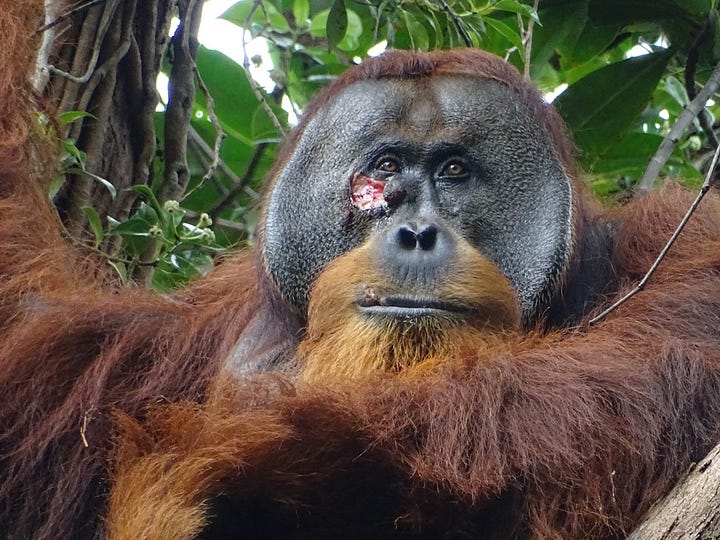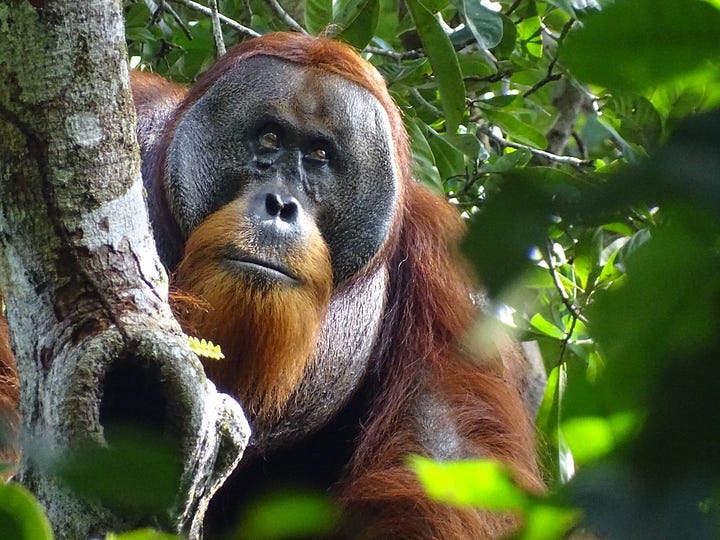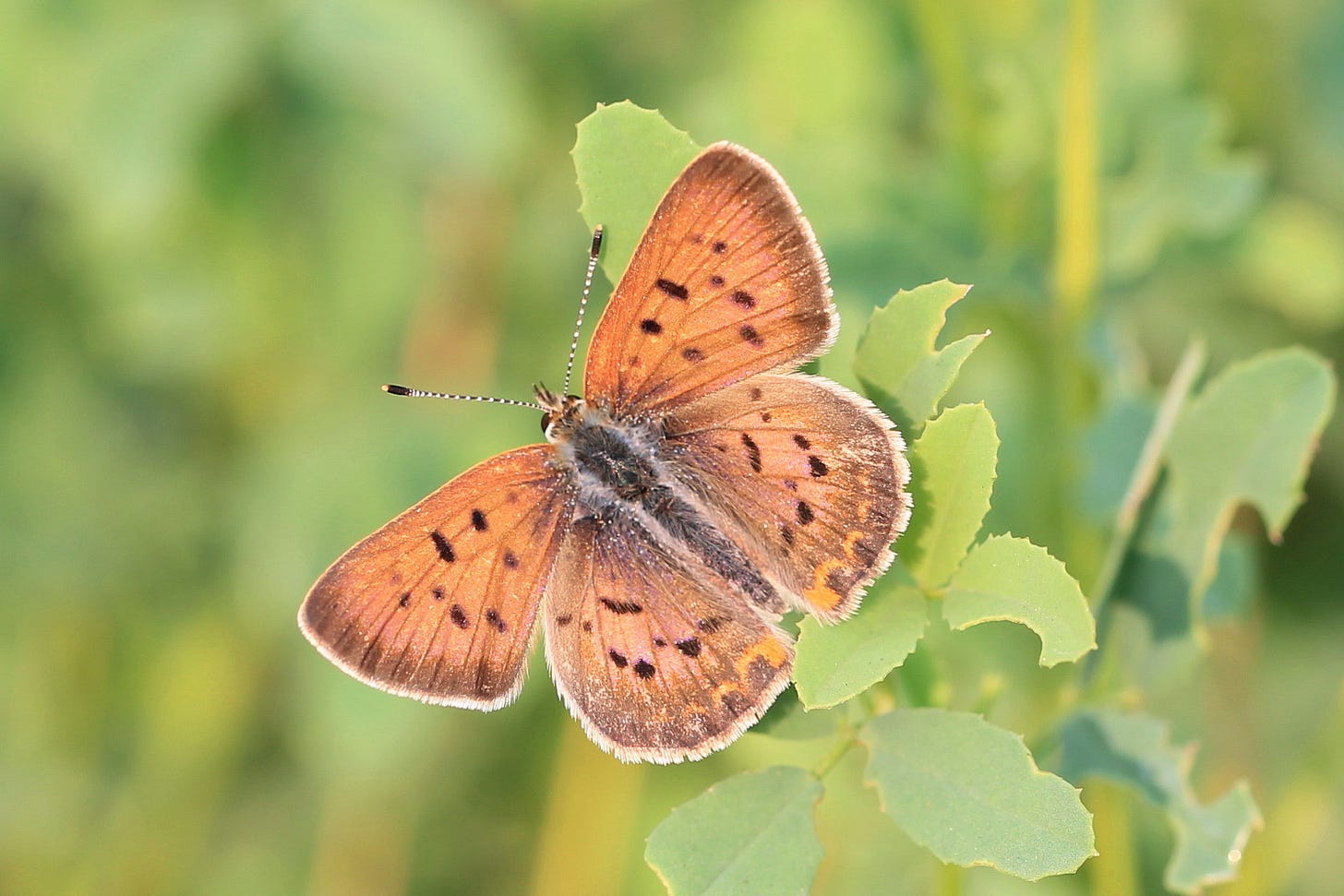by Richard Conniff


PRIMATE PRACTICING NATURAL MEDICINE
We might like to think that our drugs and emergency medical care are uniquely human products of modern technology. But think again.
In a protected peat swamp on the island of Sumatra, researchers noticed that a wild male Sumatran orangutan (Pongo abelii) had suffered a significant laceration just below one eye, probably during a fight with another male.
The animal, nicknamed Rakus by the researchers, then treated the injury by methodically chewing leaves from Fibraurea tinctoria, a type of liana, or climbing plant. First, he applied the resulting liquid to the wound. Then he covered the completely with chewed leaves. The entire treatment took a half-hour, affected only the wound site, and appeared to be intentional. Five days after researchers first observed the fresh wound, it had completely closed over. After two months (see photo), the injury was almost unnoticeable.
Primatologist Isabelle Laumer and her colleagues described the treatment and recovery in Scientific Reports as the “the first systematically documented case of active wound treatment with a plant species know to contain biologically active substances by a wild animal.” The plant, and various other Southeast Asian lianas, contain substances known for pain- and fever-reducing effects, as well as antibacterial, anti-inflammatory, anti-fungal, and antioxidant activities. Traditional medicine in the region uses these same plants to treat diseases including dysentery, diabetes, and malaria. The researchers suggest that Rakus’s behavior “provides new insights into the origins of human wound care,” with the practice having perhaps first arisen “in a common ancestor shared by humans and great apes.”
NOTE: Staff will henceforth please refer to Rakus as Dr. Rakus.
RECOGNIZING THAT INSECTS ARE ANIMALS
It seems incredible. But even now, 36 years after E.O. Wilson celebrated them as “the little things that run the world,” nine American states still do not recognize insects as wildlife. Not monarch butterflies despite their heroic migrations, not carrion beetles that put the living world’s waste to new use, not leafcutter ants that began practicing agriculture millions of years before humans.
So the good news this week is that one of those states, Colorado, has corrected this glaring error, recognizing the animal nature of insects and other invertebrates, and authorizing its Colorado Parks and Wildlife agency to study and conserve them, along with the plants they depend on. Colorado is particularly concerned that the loss of pollinator species threatens the survival of its celebrated alpine wildflower meadows (not to mention its entire agricultural economy). Even the United States Forest Service, not generally known for its treehugger attitude, puts the big picture plainly: “Without pollinators, the human race and all of earth’s terrestrial ecosystems would not survive.”
Here are the states that still haven’t realized that insects are the most valuable wildlife there is: Alaska, Arizona, Nevada, Oregon, Pennsylvania, Utah, West Virginia and Wyoming. If you’re a resident of one of these states, please contact your legislators and wake them up with a butterfly kiss.
Oh, wait, bad idea. Just wake them up.
DO FOSSIL FUEL PROFITS MATTER MORE THAN SURVIVAL?
Last week I reported on reported on the continuing negotiations to reach a Global Plastics Treaty by the end of year. It matters because research has shown direct links between microplastics in the human body and incidence of heart attack, stroke, and death. Microplastics also turn up in the bodies of wild animals, presumably with equally dire effects. All that, plus the conversion of our oceans into a vast soup of discarded plastic, seems like good reason to put a cap on total worldwide production of plastics.
But maybe don’t count on it happening this year. Almost 200 lobbyists from the fossil fuel and chemical industries registered to attend the latest negotiating session in Ottawa, according to a new analysis from the Center for International Environmental Law (CIEL). They “registered more representatives than the smallest 87 country delegations combined,” according to CIEL.
“Lobbyists are appearing on country delegations,” warned Delphine Levi Alvares, a CIEL campaigner, “and are gaining privileged access to Member State-only sessions, where sensitive discussions unfold behind closed doors. Beyond the troubling number of lobbyists present at the negotiation talks, behind-the-scenes industry lobbying activities and events take place around the world in the months leading up to negotiations.”




